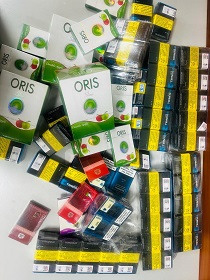
By Davis Mugabi
British American Tobacco (BAT) Uganda and BAT Kenya find themselves on the spot following an independent investigation which reveals that the companies may have taken advantage of the loopholes in tobacco control governance systems and control of the illicit trade of Tobacco products to dump illicit cigarettes into the country.
This website on spot check market survey has since established that several cigarette packets clearly labeled with digital export tax stamps for Rwanda, Tanzania and Democratic Republic of Congo have been dumped into the Ugandan Market.
Ironically, last year, BAT Uganda launched a study, which found that 23% of cigarettes sold in Uganda were illicit, indicating unfair competition to the established tobacco dealers and loss of revenue to government.
The findings based on BAT Uganda’s approved study was carried out in the second half of 2021 by Kantar, and indicated that there was a 54.5% increase in illicit trade in cigarettes in country compared to September 2020 when the number stood at 15.4%.
The term illicit, according to BAT, refers to any cigarette pack, which based on its physical features, appears to be non-compliant with applicable legal requirements for sale in the country.
This publication bought close to 30 different packets of the Dunhill Switch which was specifically manufactured for the DRC market and also Dunhill Sweet for the Rwanda market and Tanzania respectively that were being sold in different bars, shops including Petrol stations such as ORYX and on the streets of Kampala. These (prices) range from Shs 25,000-Shs80,000 depending on the Location/venue.

The cigarettes had clearly been smuggled and were untaxed and unregulated.
Last year, Uganda Revenue Authority noted that trade in illicit cigarette trade could have cost the government of Uganda a total loss of about sh30b in revenue.
Ironically, BAT in its 2022 performance results, said they had recorded a 6% revenue growth, to Sh99.5b.
BAT Uganda Managing Director, Mathu Kiunjuri said: “Whilst our business remains resilient, we reiterate our concern regarding the escalating prevalence of the illicit trade in tobacco products.”
It should be noted that on the 16th March, 2023 BAT sponsored a Public-Private Sector Dialogue on Illicit Trade which was held at Kampala Serena Hotel, Kyoga Hall.
In line with the Anti-Tobacco Control Act, such public engagements are not supposed to be sponsored by Tobacco Companies but BAT has continued to enjoy a front seat and showing the public that it fighting Illicit Trade and yet Government continue to loose revenue through BAT Brands being smuggled into the Country.
At the end of 2022, the illicit trade incidence in illicit tax-evaded cigarettes stood at approx. 29%, up from 24% in 2021 despite the efforts in place to curb it.” He added: “We acknowledge and appreciate efforts by the Government to fight illicit trade, including seizure of illicit cigarettes by the Uganda Revenue Authority, especially at the border towns in the North and Eastern parts of the country.
While launching the Kantar report on June 28, 2022 BAT Board Chairperson, Elly Karuhanga, said that the biggest concern to the tobacco industry relates to tax-evaded cigarettes bearing fake stamps or no tax stamps at all.
“These products also do not bear the prescribed graphic health warnings on their packaging, in contravention with the Tobacco Control Regulation, 2019,” he said. Karuhanga said the study reveals that more than half of illicit cigarettes (51%) on the market appear to be manufactured in Uganda based on the park markings with the rest being smuggled into the country from other countries and yet our investigations prove that what BAT said is True only that much of the products falling in that category are their high end brands.
The packets bought by our reporters indicate that the same cigarettes being sold on the Ugandan market and imported from BAT sister company BAT Kenya were illicit and did not have the marks, no health warnings, packaging or labeling requirements which was a requirement set by the Ministry of Health and were readily available to several youths endangering their lives. They also didn’t have the necessary digital tax stamps of Uganda.
These illicit products bought were untaxed and unregulated, and had According to a report by the World Health Organization affordability and accessibility to such cigarettes lead to increased use, this downward spiral into poverty and illness because of money spent on tobacco, and additional money spent on treating its ill-health effects, has dire health and economic consequences.
WHO in its 2022 report says that Tobacco use kills nearly 6 million people every year, including the 600 000 who are killed by the effects of exposure to second-hand smoke. Tobacco use is one of the main risk factors for a number of non-communicable diseases, including cancer, lung diseases and cardiovascular diseases.
Negative health impacts are associated with the use of all types of tobacco, including cigarettes, water pipes and smokeless tobacco.
The adverse health effects of tobacco use are also experienced by non-smokers exposed to second-hand smoke. Long-term exposure to second-hand smoke increases the risk of lung cancer, coronary heart disease and respiratory problems.

The invisible hand in the tobacco industry
Our investigation has revealed that cigarettes were being smuggled into the country disguised as legitimate brands such as Sportsman which is serious customs offence and could attract penalties and jail sentence if found guilty in line with the East African Community Customs Management Act section 203, 207,208 and 210 respectively.
Recommended actions
Among WHO recommended actions for eliminating the illicit trade in tobacco products, is to commit to, and become Party to the Protocol to Eliminate Illicit Trade in Tobacco Products. Ratifying, accepting, approving or acceding to the Protocol, is the starting point to saving lives lost to tobacco.
Illicit tobacco trade protocol
This Protocol to the WHO Framework Convention on Tobacco Control is the first international legal instrument that provides countries with guidance on political, technical and international collaboration, needed to eliminate the illicit trade in tobacco products.
Eliminating the illicit trade of tobacco products, will increase tobacco product prices, lower consumption, reduce premature deaths, and increase government revenues. Ratification, acceptance, approval or accession to the Protocol to Eliminate Illicit Trade in Tobacco Products is the starting point.
The Uganda Revenue Authority has today 5th March, 2023 launched an operation targeting BAT products and this online reporter awaits to see what action will be done on all those behind.
It should be noted that Tax evasion is a Board room policy and from research BAT has been a subject of various Tax Evasion Investigations cases and Uganda should be on a watch out,
It is alleged that for every carton imported into the country from Kenta, some Dunhill Bombers are hidden. This will be the work of Customs to subject risk management and verify 100% on such consignments.
Contacted for a comment the BAT MD Mathu Kiunjuri said he was not in Uganda and the company will issue a statement at an appropriate time.
Our investigations teams visited various places and made purchases of the Illicit Brands and the following are established source of BAT brands as detailed:
1.cask bar Kololo,
2. Plot 8 Lougue kololo
3. Levers bar kololo
4. Lavent najera
5.Old timers ntinda
6.Total Ntinda
7.Oryx Nalya
8.Total Kyaliwajara
9.Nexus Najera
10.Chambers Ntinda
11.Shell Kiwatule
12.Oryx kiwatule
13.Xhub Najera
14.Oryx Lugogo bypass.






